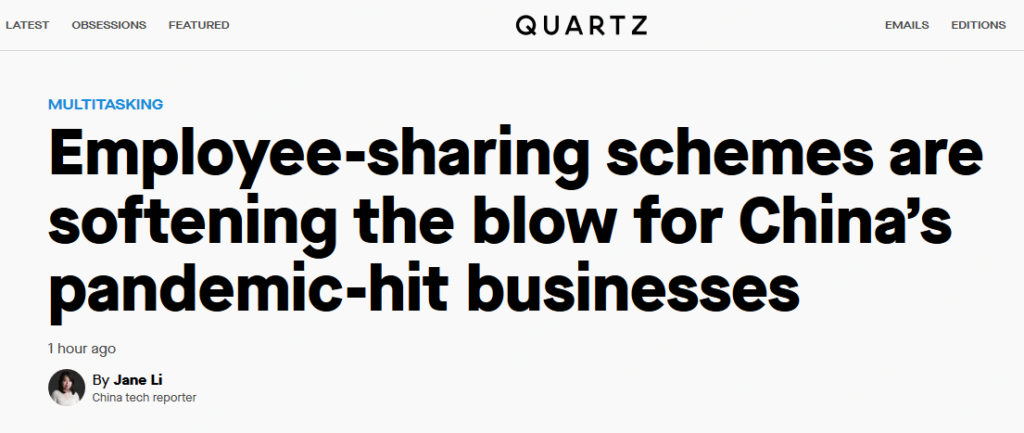Apr 24, 2020|
Quartz Highlights JD.com’s Employee-sharing Initiative
by Yuchuan Wang and Ella Kidron
On April 24th, a story by Quartz was featured in the media’s “Because China” section. The section, deemed one of Quartz’ ‘Obsessions’ (or topics that the media is following in the moment), features news and stories to keep global audiences updated on the latest developments in China in technology, education, consumption and other aspects.
The article entitled “Employee-sharing schemes are softening the blow for China’s pandemic-hit businesses” shares the story of Yang Tao, a sushi chef at a Japanese restaurant in Beijing, who enrolled as a shared employee at JD.com’s supermarket chain 7FRESH. When COVID-19 broke out in China, many restaurants faced significant difficulties, forcing a large number of employees out of their jobs. In February, to help combat this, JD.com launched a “talent sharing” plan in which its supermarket chain 7FRESH would hire short-term staff from restaurants, hotels, cinemas and other temporarily closed retail establishments, to help partners and their employees get through the special time.
Sushi chef Yang Tao worked at JD.com’s 7Fresh supermarket chain during the outbreak, sorting and bagging groceries
Chunhua Cao, the head of human resources at 7Fresh, told Quartz that the chain also requires third-party human resources agencies that coordinate work-sharing arrangements to purchase coronavirus-related insurance for the workers, while the chain itself provides work meals and other protections in the same way it does for full-time employees.
“The workers’ original companies continued to pay for their insurance and other benefits, while the new, temporary employers paid their wages, usually on an hourly basis. When things picked up at the original companies again, they returned to their old jobs,” Quartz explains. The article adds, “The worker-sharing scheme has thrown a lifeline to China’s smaller companies, especially restaurants…employee-sharing allows them (the companies) to shed some of those costs while continuing to keep their employees on the books, so they’re ready to hire workers back properly again when things pick up.”
It concludes, “Such schemes are also being adapted on a much smaller scale in the US, where more than 90% of the country’s 125,0000 restaurant workers were idle by late March, according to the Wall Street Journal, citing labor union UNITE HERE.”
Headquartered in New York, Quartz is a business-focused news organization that provides global perspectives on the most pertinent issues.






 JD Health Launched Its Diabetes Center to Provide Comprehensive Management for Patients
JD Health Launched Its Diabetes Center to Provide Comprehensive Management for Patients


